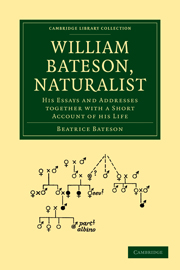Book contents
- Frontmatter
- Contents
- MEMOIR
- Hybridisation and Cross-breeding as a Method of Scientific Investigation
- Problems of Heredity as a subject for Horticultural Investigation
- An Address on Mendelian Heredity and its application to Man. Delivered before the Neurological Society, London, I. ii. 1906
- Gamete and Zygote. A Lay Discourse. The Henry Sidgwick Memorial Lecture, 1917
- Heredity and Variation in Modern Lights
- Presidential Address to the Zoological Section, British Association: Cambridge Meeting, 1904
- Presidential Address to the Agricultural Subsection, British Association: Portsmouth Meeting, 1911
- Presidential Address to the British Association, Australia: (a) Melbourne Meeting, 1914. (b) Sydney Meeting, 1914
- The Methods and Scope of Genetics. Inaugural Lecture delivered 23 October 1908. Cambridge
- Biological Fact and the Structure of Society. The Herbert Spencer Lecture, 28 February 1912. Oxford
- Science and Nationality. Presidential Address delivered at the Inaugural Meeting of the Yorkshire Science Association
- Common-sense in Racial Problems. The Galton Lecture
- Evolutionary Faith and Modern Doubts. Address to American Association for the Advancement of Science. Toronto, 1922
- Progress in Biology. An Address delivered March 12, 1924, on the occasion of the Centenary of Birkbeck College, London
- EDUCATIONAL ESSAYS
- Address to the Salt Schools, Saltaire, Shipley. 7 December 1915
- Evolution and Education
- The Place of Science in Education
- Classical and Modern Education
- Classical Education and Science Men. (Précis of evidence offered to the Prime Minister's Committee on Classics. June 1920)
- REVIEWS
- APPENDIX
- INDEX OF PERSONS
- INDEX OF SUBJECTS
- PLATES I-III (Figs. 1-6) to Mendelian Heredity and its application to Man
Classical Education and Science Men. (Précis of evidence offered to the Prime Minister's Committee on Classics. June 1920)
Published online by Cambridge University Press: 07 September 2010
- Frontmatter
- Contents
- MEMOIR
- Hybridisation and Cross-breeding as a Method of Scientific Investigation
- Problems of Heredity as a subject for Horticultural Investigation
- An Address on Mendelian Heredity and its application to Man. Delivered before the Neurological Society, London, I. ii. 1906
- Gamete and Zygote. A Lay Discourse. The Henry Sidgwick Memorial Lecture, 1917
- Heredity and Variation in Modern Lights
- Presidential Address to the Zoological Section, British Association: Cambridge Meeting, 1904
- Presidential Address to the Agricultural Subsection, British Association: Portsmouth Meeting, 1911
- Presidential Address to the British Association, Australia: (a) Melbourne Meeting, 1914. (b) Sydney Meeting, 1914
- The Methods and Scope of Genetics. Inaugural Lecture delivered 23 October 1908. Cambridge
- Biological Fact and the Structure of Society. The Herbert Spencer Lecture, 28 February 1912. Oxford
- Science and Nationality. Presidential Address delivered at the Inaugural Meeting of the Yorkshire Science Association
- Common-sense in Racial Problems. The Galton Lecture
- Evolutionary Faith and Modern Doubts. Address to American Association for the Advancement of Science. Toronto, 1922
- Progress in Biology. An Address delivered March 12, 1924, on the occasion of the Centenary of Birkbeck College, London
- EDUCATIONAL ESSAYS
- Address to the Salt Schools, Saltaire, Shipley. 7 December 1915
- Evolution and Education
- The Place of Science in Education
- Classical and Modern Education
- Classical Education and Science Men. (Précis of evidence offered to the Prime Minister's Committee on Classics. June 1920)
- REVIEWS
- APPENDIX
- INDEX OF PERSONS
- INDEX OF SUBJECTS
- PLATES I-III (Figs. 1-6) to Mendelian Heredity and its application to Man
Summary
My views on the relations between scientific and classical education were lately given in an Essay which appeared in the Cambridge Essays on Education, 1917. I regret I have no spare copies.
Education is often represented as a process by which boys originally homogeneous are converted into specialised types. I submit that all schemes of education should be planned in accordance with the physiological fact that living material is, as regards aptitudes, naturally heterogeneous. To provide adequately for those who have these various aptitudes—which may often be latent until puberty—the teaching should be as varied as possible, including elements of every kind of knowledge, to be presented in their most attractive forms, without pedantry, mysticism or prudery.
Classical teaching should, in my opinion, be maintained for all who can afford a complete education. I have continually supported compulsory classics at Cambridge, being convinced that without this requirement by the Universities they will cease to be a staple of education even in the Public Schools. Whittled as it was to nothing the Greek test became ridiculous and has now disappeared, with Latin soon to follow.
The classical teachers are themselves very greatly to blame for the contempt in which their subject is usually held by scientific and practical men. They have steadily refused to put grammar anywhere but first. It is possible to know a language enough for many purposes both of use and enjoyment with very slender equipment in grammar.
- Type
- Chapter
- Information
- William Bateson, NaturalistHis Essays and Addresses Together with a Short Account of His Life, pp. 446 - 448Publisher: Cambridge University PressPrint publication year: 2009First published in: 1928

